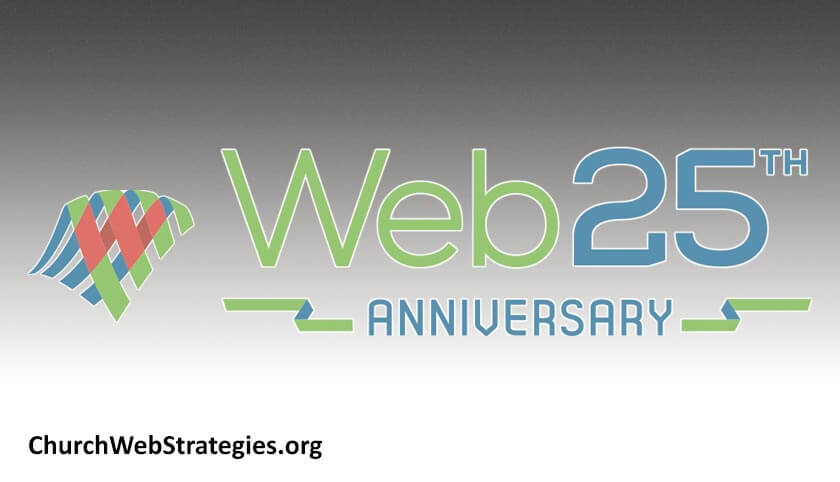Without a World Wide Web, there would be no church websites, online ministry, or social media. Last week., on May 12th, 2014, we celebrated the 25th birthday of the web. Considering how dependent we are upon the web and the many things it enables, we should pause and take note. Most important would be the founding principles that Tim Berners-Lee had at the forefront when he proposed this new technology that would change the way we live our lives.
On the WebAt25 (now defunct) website, there are many interesting news clips, “thank you” notes to Tim Berners-Lee. Most interesting was a page titled “25 things you probably didn’t know about the Web”. The eleventh fact delved into what made the Web successful. Here are four factors that made the web successful, and what you can learn from them.
Universal
The web was made to work with any form of data, on any device, with any software, and in any language. Does your church website meet any of these criteria? Do you utilize proprietary data types that require plugins? How well does your website render on tablets and phones? Although it is not so common these days, does your website only render properly on a particular browser? Lastly, do you have any functionality to show your website in a different language? Depending on your answers, you may feel that the web has quite a leg up on your site. Although you do not need to be so universal, consider how your next project can get you moving on one of these areas.
Decentralized
The web was made to be decentralized, in that anyone could create a site. This freedom allowed the web to grow to the size it is today, approaching 1 billion sites. This concept can apply to your web team. Who has the authority to create and publish content? If it is only one person, you are doing it wrong. I have talked about this before, but utilize several people to help your website grow and mature.
Royalty-Free
The core technology that runs the web is royalty-free. HTML does not require a license, and it is free to create a website. Have you embraced this spirit and give away as much as you possibly can on your church website? I addressed this in my Open Source Church article; but re-examine how your website can share more things with no strings attached. If you must require some sort of payment, consider it be just a valid email address or some demographic information; something that can help grow in the future.
Collaboration
Many aspects and projects that built and built upon the web were the result of collaboration. Have you ever considered hosting a meet-up to swap and share ideas with fellow church web teams? Do you provide missions with financial support? Why not also help them with their websites? By collaborating you are advancing God’s kingdom, while breaking down the silos that have formed within the global church.
Action Item
If you have not done so already, check out the WebAt25 website. Learn more about the roots of the web and the philosophies that helped it grow to the powerhouse technology it is today. Examine the above principles and ideas to see how you can grow your website by using the ideas that helped the web itself grow.
This article was inspired by Episode #114 of the Big Web Show, which talked about the significance of the Web turning 25

